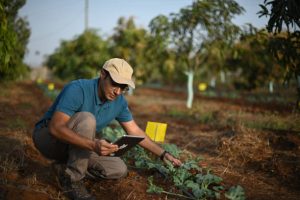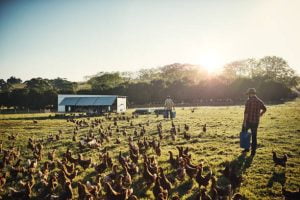Top 10 Best Agricultural Courses to Study in Nigeria
Agriculture is a vast field with so many branches under it.
If you are interested in studying agriculture in Nigeria, one issue you may face is how to choose the best agricultural course for you.
In Nigeria, there are several agricultural courses offered at different higher institutions.
However, among these courses, some are known to be more profitable than others.
Nigeria is an agriculture-rich country and a career in agriculture can be highly rewarding and fulfilling.
But which agricultural courses are best to study in Nigeria?
If you are among those asking these questions, I got you covered!
In this article, I will show you the top 10 best agricultural courses to study in Nigeria.
So by the end of this article, you will find out more about these agricultural courses and proceed to apply for anyone you are interested in.
Ready? Let’s dive in!
Also Read: 20 Best Universities to Study Agriculture in Nigeria
Top 10 Best Agricultural Courses to Study in Nigeria
Here are the top 10 best agricultural courses to study in Nigeria:
1. Agronomy

Agronomy is definitely one of the best agricultural courses to study in Nigeria!
It’s all about mastering the science and practicality of crop production.
You’ll learn everything from soil management and plant breeding to pest control and agricultural economics.
Since agriculture is a vital part of Nigeria’s economy, agronomy graduates are in high demand.
You can work on commercial farms, research institutions, or even advise farmers and government agencies.
With agronomy, you’ll contribute to improving food security and sustainable farming practices in Nigeria.
It’s an exciting field for anyone passionate about making a difference in the agricultural sector!
2. Animal Science

If you’re looking for an awesome agricultural course to study in Nigeria, Animal Science is where it’s at!
You’ll dive deep into the world of livestock production and learn all about animal nutrition, breeding, health, and farm management.
With Nigeria’s booming agricultural sector, there’s a huge demand for Animal Science graduates.
You can work on livestock farms, specialize in poultry production, or even dive into aquaculture.
Plus, you’ll be contributing to food security and sustainable farming practices.
So, if you’re passionate about animals and want to make a difference in Nigeria’s agriculture, Animal Science is the way to go!
3. Agricultural Economics

If you’re interested in agriculture and economics, Agricultural Economics is a fantastic course to study in Nigeria.
It’s all about applying economic principles to farming, production, and policies.
With agriculture being a major part of Nigeria’s economy, there’s a high demand for Agricultural Economics graduates.
You can work as a consultant, researcher, or even start your own agribusiness.
By studying Agricultural Economics, you’ll gain valuable insights into market dynamics, resource allocation, and strategies for agricultural development.
It’s an exciting field that lets you make a real impact on Nigeria’s agricultural sector while also pursuing your passion for economics.
Recommended: Is Agricultural Economics a Good Course to Study in Nigeria?
4. Crop Science
If you’ve got a green thumb and love the idea of growing crops, Crop Science is an awesome agricultural course to study in Nigeria.
You’ll dive deep into the science of plants, from their physiology and genetics to breeding and protection.
Nigeria’s agriculture sector relies heavily on crops, so Crop Science graduates are in high demand.
You can become a crop researcher, agronomist, or even start your own farm.
By studying Crop Science, you’ll learn how to boost agricultural productivity, promote sustainable farming methods, and contribute to ensuring Nigeria’s food security.
It’s a field that lets you get your hands dirty and make a real impact!
5. Agricultural Extension and Rural Sociology
If you’re passionate about helping farmers and rural communities, Agricultural Extension and Rural Sociology is an amazing agricultural course to study in Nigeria.
It’s all about spreading agricultural knowledge and technology while understanding the social and economic aspects of rural areas.
You’ll learn how to connect farmers with research institutions, improving farming practices and boosting productivity.
Plus, you’ll dive into the challenges faced by rural communities and work towards their development.
With Nigeria having a mostly rural population, this course opens doors to meaningful careers in agricultural consulting, community development, and policymaking.
6. Soil Science
If you’re into digging in the dirt and discovering the secrets of soil, Soil Science is an awesome agricultural course to study in Nigeria.
You’ll learn all about soil properties, fertility, conservation, and management, which are super important for sustainable farming.
With Nigeria’s diverse agricultural landscape, understanding the soil is key to maximizing crop growth and productivity.
Soil Science graduates are in high demand because they help ensure food security, protect the environment, and manage resources efficiently.
So, if you want to get your hands dirty and make a real impact on Nigeria’s agriculture, Soil Science is the way to go!
Also See: Can An Agricultural Economist Work in a Bank in Nigeria?
7. Horticulture
If you’re all about plants and love the idea of growing fruits, veggies, and beautiful flowers, Horticulture is an amazing agricultural course to study in Nigeria.
It’s like the art and science of plant growing!
You’ll learn how to propagate plants, manage greenhouses, and even design stunning landscapes.
With Nigeria’s diverse agriculture scene and a growing demand for specialty crops, Horticulture graduates are in high demand.
You can work on big farms, start your own nursery, or create a thriving gardening business.
By studying Horticulture, you’ll turn your passion into a rewarding career and make the world a greener, more beautiful place!
8. Fisheries and Aquaculture
If you’re into the underwater world and love the idea of fish farming and aquatic management, Fisheries and Aquaculture is a fantastic agricultural course to study in Nigeria.
You’ll dive into the science and techniques of raising fish and other aquatic creatures.
With Nigeria’s abundant water resources and the demand for seafood on the rise, Fisheries and Aquaculture graduates are in high demand.
You can work on fish farms, conduct research, or even start your own aquaculture venture.
By studying this course, you’ll play a vital role in ensuring food security, sustainable fishing practices, and contributing to Nigeria’s economic growth.
9. Agricultural Engineering
If you’re into engineering and want to make a big impact in agriculture, Agricultural Engineering is an awesome course to study in Nigeria.
It’s all about using engineering principles to design and improve farming machinery, equipment, and structures.
With Nigeria’s booming agriculture sector, there’s a high demand for Agricultural Engineering graduates.
You can work on irrigation systems, develop innovative farm machinery, or even design post-harvest processing facilities.
By studying Agricultural Engineering, you’ll help increase productivity, reduce losses, and promote sustainable farming practices.
Get ready to combine your love for engineering with your passion for agriculture and create a meaningful career!
10. Food Science and Technology
If you’re a food enthusiast and love the idea of working with food, Food Science and Technology is a fantastic agricultural course to study in Nigeria.
It’s all about the science and technology behind food processing, preservation, and ensuring quality.
With Nigeria’s abundant agricultural resources and a thriving food industry, Food Science and Technology graduates are in high demand.
You can be part of ensuring food safety, developing delicious new food products, and improving food processing techniques.
From working in food manufacturing to quality assurance and research, this field offers exciting career opportunities.
Recommended: Top 20 Best Medical Courses to Study in Nigeria
Factors to Consider When Choosing the Best Agricultural Course for You in Nigeria
When it comes to choosing the best agricultural course in Nigeria, there are several factors you should consider.
Let me break them down for you!
1. Personal Interests
First and foremost, think about your personal interests within the field of agriculture.
What aspect of agriculture excites you the most?
Is it crop production, livestock farming, agribusiness, agricultural engineering, or research?
Identifying your passion will guide you in selecting a course that aligns with your interests.
Remember, studying something you are passionate about will keep you motivated throughout your studies and future career.
2. Career Opportunities
Research the job market to understand the potential career opportunities available in the agricultural sector.
Look for courses that offer skills and knowledge in high-demand areas.
Horticulture, agricultural engineering, soil science, agricultural economics, and food science and technology are some examples.
By choosing a course that focuses on these areas, you increase your chances of finding suitable employment after graduation.
3. Accreditation and Quality
Next, ensure that the institution and the course you choose are accredited by relevant regulatory bodies in Nigeria.
Accreditation is crucial as it guarantees that the program meets quality standards.
Having an accredited qualification will enhance its recognition and credibility in the job market.
4. Institution’s Reputation
Consider the reputation of the institution offering the agricultural course.
Look for institutions known for their expertise in agricultural education, research, and practical training.
Graduating from a reputable institution can give you an edge in your career and open doors to more opportunities.
Conduct thorough research and seek feedback from current and former students to assess the institution’s reputation.
5. Curriculum and Course Structure
Evaluate the curriculum and course structure of the agricultural program you are interested in.
Check if the course covers a broad range of agricultural subjects and offers practical training, internships, or fieldwork opportunities.
A well-rounded curriculum that combines theoretical knowledge with practical experience will provide a solid foundation for your future career.
Practical training opportunities are particularly valuable as they allow you to apply what you learn in real-world agricultural settings.
6. Facilities and Resources
Assess the availability and quality of facilities and resources offered by the institution.
Look for laboratories, research farms, greenhouses, and modern agricultural equipment.
These resources play a crucial role in enhancing your learning experience and practical skills development.
Practical exposure to the latest tools and technologies will prepare you for the challenges of the agricultural industry.
7. Networking and Industry Connections
Consider the networking opportunities and industry connections offered by the institution.
Look for programs that provide internships, industry visits, guest lectures from agricultural experts, and opportunities to participate in conferences or workshops.
These activities can help you build a strong professional network and gain exposure to the industry.
Networking is essential in the agricultural sector, as it can lead to internships, job offers, and valuable collaborations.
8. Affordability and Financial Aid
Evaluate the cost of the agricultural course, including tuition fees, accommodation, and other related expenses.
Determine if you are eligible for scholarships, grants, or financial aid programs offered by the institution or external organizations.
Assessing the affordability of the course is crucial to ensure that it fits within your budget.
Explore available financial aid options to ease the financial burden and make the course more accessible.
9. Location
Consider the location of the institution offering the agricultural course.
Think about factors such as proximity to agricultural hubs, access to research facilities, climate suitability for practical training, and the availability of internship or job opportunities in the area.
Choosing a location that offers practical advantages can enhance your learning experience and provide opportunities for hands-on training and networking within the local agricultural community.
10. Future Growth and Trends
Lastly, keep an eye on emerging trends and technologies in the agricultural sector.
Look for a course that embraces innovation, sustainability, and modern agricultural practices.
By choosing a program that incorporates these elements, you will be better prepared for the future of agriculture and more competitive in the job market.
Overall, carefully evaluating these factors will help you make an informed decision that aligns with your interests, goals, and future career prospects.
Also See: 20 Federal Universities that Offer Pharmacy in Nigeria
Frequently Asked Questions (FAQ)
Which Agricultural Course Is Most Profitable in Nigeria?
Finding the most profitable agricultural course in Nigeria depends on a few factors.
You have to consider things like market demand, where you’re located, and what you’re personally interested in.
Generally, courses focused on modern farming techniques, agribusiness management, and value chain development tend to be lucrative.
Specializing in areas like poultry farming, fishery, crop production, and horticulture can open up profitable opportunities.
Just remember to keep up with the latest trends, invest in modern technologies, and do some market research to maximize your profitability.
Which Type of Farmer Makes the Most Money in Nigeria?
When it comes to making money as a farmer in Nigeria, it really depends on a few things.
Generally, farmers involved in commercial agriculture, like large-scale crop production, poultry farming, and fishery, have the potential to earn more.
But it’s not just about the type of farming, it’s also about adopting modern technologies, integrating value chains, and focusing on exports.
Profitability also relies on factors like market demand, efficient management, and access to resources.
So, it’s all about finding the right opportunities within the agricultural sector.
What Is the Best Agriculture Business to Start in Nigeria?
Are you curious to know the best agriculture business to start in Nigeria?
Well, when it comes to starting an agriculture business in Nigeria, there are a few options that have shown great potential.
Poultry farming, fishery, growing high-value crops, and horticulture are all worth considering.
If you prefer agribusiness, you could look into processing and packaging, agricultural consulting, or supply chain management.
Just make sure to do your research and consider factors like market demand, profitability, available resources, and what you’re genuinely interested in.
Staying informed about industry trends is also crucial for increasing your chances of success.
Which Agricultural Products Have High Demand in Nigeria?
When it comes to agricultural products in high demand, Nigeria has quite the appetite!
Rice, maize, cassava, poultry products, fish, veggies, fruits, and palm oil are all hot favorites.
But that’s not all! There’s a rising trend for processed foods, packaged goods, and organic produce too.
To stay ahead, farmers and entrepreneurs should keep an eye on market trends, what consumers crave, and government policies.
It’s all about seizing the opportunities and satisfying the ever-growing hunger of the Nigerian agricultural market!
Which Country Is Best for Agricultural Jobs?
Countries like the United States, Canada, Australia, and Brazil offer plenty of agricultural job opportunities due to their large agricultural sectors.
If you’re looking for innovation, countries like the Netherlands and Germany are known for their advanced farming practices.
Don’t forget about developing countries like India, China, and Nigeria, which also have thriving agricultural industries.
The key is to consider your goals, skills, and the specific sector you’re interested in when exploring job opportunities in agriculture.
Recommended: Which Is Better Nursing or Pharmacy in Nigeria?
Conclusion
While there are many agricultural courses offered at different Nigerian universities, not all are still relevant in today’s world.
When pursuing a career in agriculture in Nigeria, it is advisable to for any of the best agricultural courses available within the country.
This helps to ensure that you are able to secure your dream job in the agricultural sector after you graduate from school.
In this article, I have shown you the top 10 best agricultural courses to study in Nigeria.
So it’s now time to dig deep into these courses and identify the one that suits you best and then proceed to apply for it.
If you have any questions or inquiries, kindly drop them in the comment section and I will respond as fast as I can.
Good luck!
Related Posts:
- 15 Best Science Courses to Study in Nigeria
- 13 Best Art Courses to Study in Nigeria
- List of State Universities Offering Pharmacy in Nigeria
- 10 Best Private Universities to Study Pharmacy in Nigeria
- 20 Secrets of First Class Students in Nigeria
- How to Improve Your Public Speaking Skills as a Nigerian Student
- How to Improve Your Writing Skills as a Nigerian Student
- How to Write a Winning Scholarship Essay as a Nigerian Student
- What Causes Failure in WAEC in Nigeria? (Top 20 Reasons)
- 10 Steps for Writing WAEC Informal Letter






